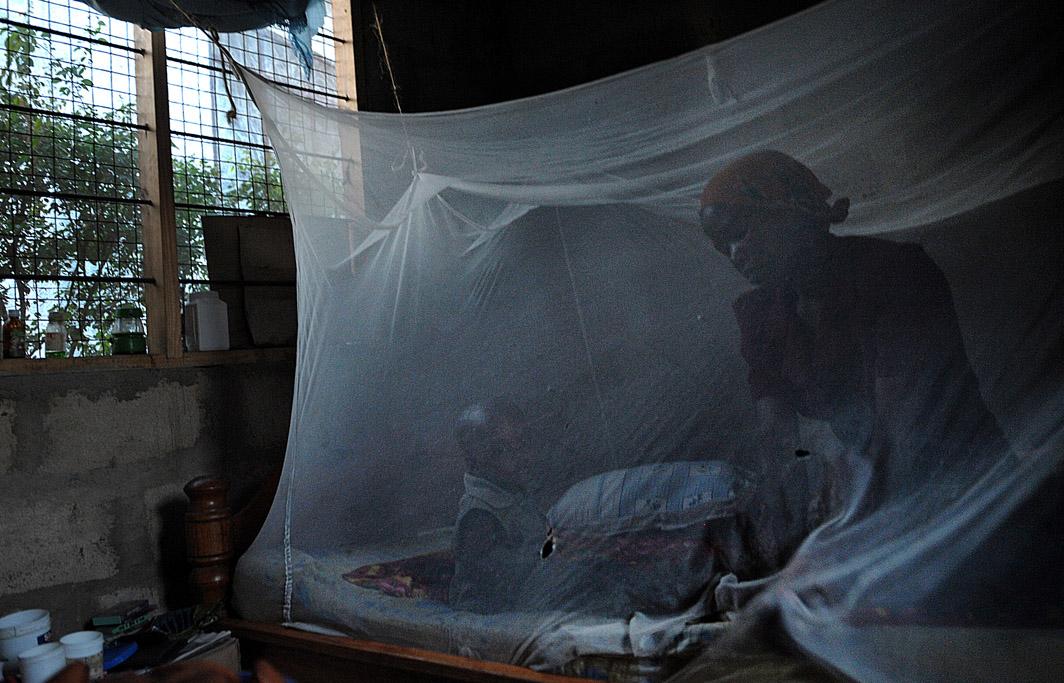Global Fund turns 10, but where’s the party?
A mother and her child sit on a bed covered with a mosquito net in Tanzanian where a pioneering vaccine against malaria is in being tested at the government-run Ifakara Health Institute.
Last week, amidst all the furor over pink ribbons and the Komen Foundation, another, quieter story unfolded. Without much fanfare, the Global Fund to Fight AIDS, Tuberculosis and Malaria turned 10.
Over its first decade, the Global Fund has saved millions of lives — getting 3.3 million people with HIV into lifesaving treatment, detecting and treating nearly 9 million cases of infectious tuberculosis, and distributing nearly a quarter of a billion insecticide-treated bednets to protect families from malaria. In light of these achievements, and of the enormous remaining need, there wasn’t as much celebration as you might have expected for this historic birthday. The past year has been a rough one for the Global Fund —a shortfall in donor pledges, the cancellation of its next round of funding (Round 11), and changes in leadership have left many asking what will become of the Fund and the millions of people whose lives it saves.
More from GlobalPost: Global health a ‘window’ into addressing spectrum of challenges
As long-time advocates for reproductive and maternal health, we often find ourselves on the periphery of debates about funding for HIV, tuberculosis, and malaria programs. But AIDS, TB, and malaria are leading killers of women — 60 percent of all Africans living with HIV are women.
Reproductive and maternal health advocates should be rooting for, and working toward, a Global Fund that is vital, viable, and well-funded. Just like us, the Global Fund has always upheld the idea that their work contributes to achievement of all of the health-related Millennium Development Goals (MDGs). You can’t achieve MDG 6 (combat HIV/AIDS, malaria and other diseases) if you don’t also achieve MDG 5 (improve maternal health and achieve universal access to reproductive health), and MDG 4 (reduce child mortality) as well. The Global Fund’s endorsement of this linkage isn’t just empty rhetoric. The Fund has always accepted and considered proposals that include reproductive, maternal, and child health interventions, when countries could demonstrate that they would have an impact on AIDS, tuberculosis, and malaria.
Remarkably, and distressingly, the Global Fund is one of the few donors that will fund reproductive, maternal, newborn, and child health and HIV out of the same pot of money. Countries don’t need to piece together separate HIV funds, reproductive health funds, and maternal health funds in order to finance an effective, integrated women’s health program. The Global Fund doesn’t impose bureaucratic restrictions over what services can or can’t be co-located in the same clinic, or about what health worker can provide which service and when. And, perhaps most importantly, the Global Fund recognizes, on paper and in practice, that its money has much more impact when it’s spent on treating a person and not just a disease.
More from GlobalPost: Exciting, difficult times for global health journalists
Of course, the Global Fund could do better. Its new five-year strategy recognizes integration as a very cost-effective way to deliver better health outcomes, but recent funding setbacks have held up progress on this initiative. And it has yet to fulfill its potential in funding contraceptives, providing safe labor and delivery supplies, and training health care workers to carry out integrated programs.
In 2012, the Global Fund will develop an implementation plan for its maternal, newborn, and child health integration strategy. Reproductive and maternal health advocates should be working now to ensure that this commitment to integration becomes a reality. But we should also join together with advocates focused on AIDS, tuberculosis, and malaria in demanding that donors fulfill (and increase) their commitments to the Global Fund.
The Fund has the will and the potential to make great progress — it just lacks the means. Replenishing its coffers with funds sufficient to get the job done would make a fine belated birthday gift, and give so many women the gift of better health.
